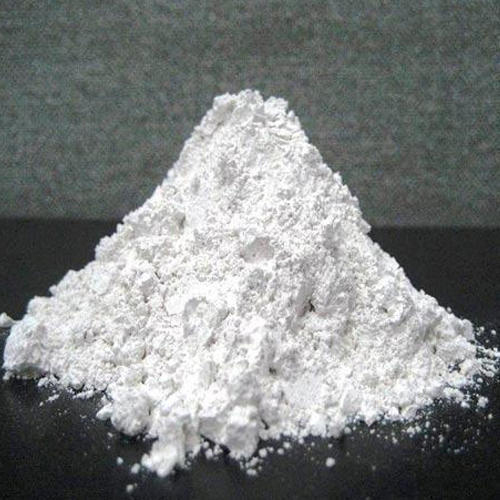
Hydrated Lime
145.00 - 175.00 USD ($)/Ton
Product Details:
- Product Type Hydraulic Lime
- Click to View more
X
Hydrated Lime Price and Quantity
- 20 Ton
- 145.00 - 175.00 USD ($)/Ton
Hydrated Lime Specifications
- Hydraulic Lime
Product Description
Hydrated Lime is an industrial grade chemical compound having a chemical formula of Ca(OH)2. It is formulated by using by adding water to calcium oxide. It appears as a white colored compound with a bitter taste. This powdered compound can be used in a wide range of industrial applications such as water treatment, pH balancing, construction, agriculture, food processing, chemical manufacturing, and many more. Hydrated Lime may cause skin and eye irritation hence it is advised to handle it with extra care using gloves and face masks. Buy from us this compound with minimum order quantity of 25 tons.
Hydrated Lime Properties:
1. Chemical Formula: The chemical formula of hydrated lime is Ca(OH)2, indicating that it consists of one calcium (Ca) atom, two oxygen (O) atoms, and two hydroxide (OH) ions.
2. Physical State: Hydrated lime is a white, odorless powder or granular substance. It has a fine texture and can be easily mixed with water to form a slaked lime paste.
3. Solubility: Hydrated lime is sparingly soluble in water. It dissolves to a limited extent, producing a slightly alkaline solution known as "lime water."
4. Alkalinity: One of the key properties of hydrated lime is its high alkalinity. When mixed with water, it produces a strongly alkaline solution due to the release of hydroxide ions.
5. pH Regulation: Hydrated lime is commonly used to raise the pH of acidic soils. It acts as a soil amendment, neutralizing acidity and providing essential calcium nutrients to plants.
6. Chemical Reactivity: Hydrated lime exhibits chemical reactivity, especially with acidic substances. It can react with carbon dioxide (CO2) in the air to form calcium carbonate (CaCO3), a process known as carbonation. This property is utilized in various applications, including in construction and as a stabilizing agent.
7. Binding and Adhesive Properties: Hydrated lime can bind with fine particles and aggregates in construction materials, such as mortar and plaster. It contributes to the strength, workability, and durability of these materials.
8. Sanitizing and Disinfectant Properties: Hydrated lime has antimicrobial properties and has historically been used to disinfect and sanitize surfaces, water, and wastewater treatment systems.
9. Water Absorption: Hydrated lime has the ability to absorb water, making it useful in drying applications. It can be used to dry gases, liquids, and solids in various industrial processes.
10. Desiccant: Due to its water-absorbing properties, hydrated lime can be used as a desiccant or drying agent to reduce moisture content in certain products or environments.
11. Environmental Applications: Hydrated lime is used in environmental applications, including wastewater treatment, flue gas desulfurization (removal of sulfur dioxide from industrial exhaust gases), and stabilization of hazardous waste.
12. Construction and Building Materials: In construction, hydrated lime is used in the preparation of lime mortar, lime plaster, and lime-based paints. It can improve the workability, adhesive properties, and durability of these materials.
Applications of Hydrated Lime:
1. Soil Stabilization: Hydrated lime is used to improve the stability and load-bearing capacity of soils. It is mixed with soils to increase their strength, reduce plasticity, and improve compaction, making them suitable for construction projects like road bases, embankments, and foundations.
2. Agriculture and Gardening:
- Soil pH Adjustment: Hydrated lime is used to raise the pH of acidic soils, creating a more favorable environment for plant growth.
- Liming: It provides essential calcium nutrients to plants and improves soil structure and nutrient availability.
3. Water Treatment:
- Drinking Water: Hydrated lime is used in water treatment processes to control pH and aid in coagulation and flocculation, helping to remove impurities and particles.
- Wastewater Treatment: It is used to treat sewage and industrial wastewater by adjusting pH, precipitating heavy metals, and facilitating sludge dewatering.
4. Construction:
- Lime Mortar: Hydrated lime is used to make lime mortar, which is a traditional building material used in masonry work. It provides workability, plasticity, and improved bond strength to bricks or stones.
- Lime Plaster: It is used to create lime plaster for interior and exterior wall finishes. Lime plaster offers breathability, durability, and aesthetic appeal.
- Lime Paint: Hydrated lime is used as a base for lime wash and lime paint, which are eco-friendly decorative coatings for walls.
5. Asphalt Modification: In road construction, hydrated lime can be added to asphalt mixes to improve their properties, such as moisture resistance, durability, and resistance to stripping.
6. Flue Gas Desulfurization (FGD): Hydrated lime is used in power plants to remove sulfur dioxide (SO2) from flue gases, reducing air pollution and acid rain.
7. Industrial Processes:
- Industrial Waste Treatment: It is used for the treatment and stabilization of hazardous waste to reduce environmental impact.
- Mining and Metals: Hydrated lime is used to neutralize acid mine drainage and treat effluents from mining and metallurgical processes.
- Chemical Manufacturing: It can be used as a reagent in various chemical reactions and processes.
8. Food and Beverages:
- Food Additive: In certain food processing applications, hydrated lime can be used to regulate pH, enhance shelf life, and improve the texture of certain products.
9. Desiccant and Drying Agent: It can be used as a drying agent in various applications, including gases, liquids, and solids.
10. Sanitization and Disinfection: Historically, hydrated lime has been used for sanitizing and disinfecting surfaces, livestock facilities, and wastewater treatment systems.
11. Medical and Pharmaceutical: In some medical and pharmaceutical applications, hydrated lime is used for its alkalinity and reactivity.
12. Art Conservation: Hydrated lime can be used in the restoration and conservation of historical buildings and artifacts.
FAQ:
Q. What is hydrated lime?
Ans: Hydrated lime, also known as calcium hydroxide (Ca(OH)2), is a chemical compound produced by adding water to quicklime (calcium oxide, CaO). It is a white, odorless powder with various industrial, construction, and agricultural applications.
Q. What is the difference between hydrated lime and quicklime?
Ans: Quicklime is calcium oxide (CaO), while hydrated lime is calcium hydroxide (Ca(OH)2). Quicklime is produced by heating limestone, while hydrated lime is produced by adding water to quicklime. Hydrated lime has a lower reactivity than quicklime and is safer to handle.
Q. What are the properties of hydrated lime?
Ans: Hydrated lime has properties like high alkalinity, pH regulation, soil stabilization, water absorption, and chemical reactivity. It can be used in construction, agriculture, water treatment, and various industrial processes.
Q. How is hydrated lime used in agriculture?
Ans: Hydrated lime is used to raise the pH of acidic soils, improve soil structure, and provide essential calcium nutrients to plants. It helps balance soil pH and enhances plant growth.
Q. What are the benefits of using hydrated lime in construction?
Ans: In construction, hydrated lime is used to make lime mortar, lime plaster, and lime-based paints. It improves workability, bond strength, and durability of these materials, and it has been used for centuries in historical buildings.
Q. How is hydrated lime used in water treatment?
Ans: Hydrated lime is used in water treatment processes to control pH, aid coagulation and flocculation, and remove impurities. It is commonly used in both drinking water and wastewater treatment.
Q. Is hydrated lime safe to handle?
Ans: While hydrated lime is generally safe to handle, it is strongly alkaline and can cause skin and eye irritation. Proper safety precautions, including wearing protective gear, should be taken when working with hydrated lime.
Q. Can hydrated lime be used for disinfection?
Ans: Hydrated lime has historical use as a disinfectant and sanitizer. However, its disinfection properties are not as potent as other modern disinfectants, and its use for this purpose is limited.
Q. What is the role of hydrated lime in flue gas desulfurization (FGD)?
Ans: Hydrated lime is used in FGD systems to remove sulfur dioxide (SO2) from industrial exhaust gases, helping to reduce air pollution and acid rain.
Q. Can hydrated lime be used in food processing?
Ans: Hydrated lime may be used as a food additive in certain food processing applications to regulate pH, improve texture, and enhance shelf life. However, its use is regulated and limited due to safety considerations.
Q. How is hydrated lime used as a desiccant?
Ans: Hydrated lime's water-absorbing properties make it suitable for use as a desiccant to reduce moisture content in gases, liquids, and solids.
Q. Is hydrated lime environmentally friendly?
Ans: Hydrated lime has various environmentally friendly applications, including soil improvement, wastewater treatment, and air pollution control. However, its production process involves heating limestone, which releases carbon dioxide.
Enter Buying Requirement Details
 |
Chemtrade International Corporation
All Rights Reserved.(Terms of Use) Developed and Managed by Infocom Network Private Limited. |

 English
English Spanish
Spanish French
French German
German Italian
Italian Chinese (Simplified)
Chinese (Simplified) Japanese
Japanese Korean
Korean Arabic
Arabic Portuguese
Portuguese